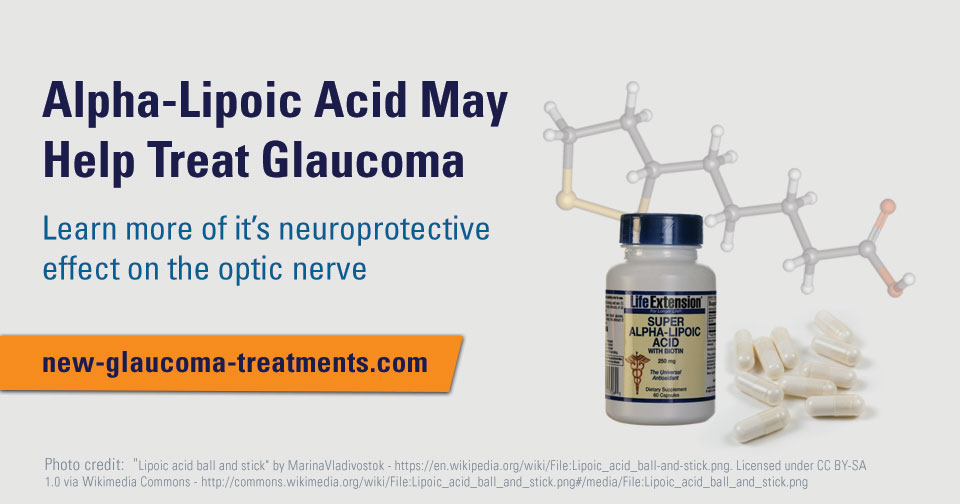Neuroprotective Effect of Alpha-Lipoic Acid
What is Alpha-Lipoic Acid?
Each cell in our body has a number of bean-shaped power generators called mitochondria. Without them we wouldn’t survive but a few seconds. But power generation at the microscopic level is messy in that it produces a lot of free-radicals. Left unchecked these could destroy the cell via oxidative damage. A powerhouse that destroys the very cell it is trying to power isn’t much good to the cell. So the cell produces a powerful antioxidant to protect it from these damaging mitochondrial byproducts. Alpha-lipoic acid is the name of this naturally occurring substance. Not only does it scavenge free-radicals, but it can actually regenerate other antioxidants.
Evidence that it can be effective in the treatment of glaucoma:
One small Russian study comparing standard glaucoma treatment to standard treatment plus Alpha-Lipoic acid in patients with open angle glaucoma reported a benefit in those patients who took 150mg per day.[1] As my knowledge of Russian is limited to names of vodkas, I can’t vouch for the quality of this study. Nevertheless, there is good evidence that Alpha-lipoic acid can provide a neuroprotective effect.[2] It’s one thing to show that a chemical can protect a cell in a petri dish, quite another to show that something taken by mouth could actually be absorbed into the bloodstream and then pass the blood-brain barrier. It turns out that Alpha-Lipoic acid, unlike many other antioxidants, easily crosses the blood-brain barrier and therefore should be available to protect central nerves such as the optic nerve from oxidative damage.
Potential Risks and Side Effects
In general Alpha-Lipoic acid is well tolerated at doses of up to 600mg per day.[3] However, both skin rash and nausea have been reported with oral use of Alpha-Lipoic acid.[4]
Additionally, Alpha-Lipoic acid can be toxic in those who are thiamine deficient. People who may be thiamine deficient (such as those who consume large amounts of alcohol) should only take Alpha-Lipoic acid with thiamine or not take Alpha-Lipoic acid at all.[5]
Potential Drug Interactions
Anti-Diabetes Drugs
In theory the use of Alpha-Lipoic acid could result in hypoglycemia (low blood sugar). In those whose blood sugar is not well-controlled this could be a good thing. However, care should be taken when used along with other antidiabetes drugs such as glimepiride (Amaryl), glyburide (DiaBeta, Glynase PresTab, Micronase), insulin, metformin (Glucophage), pioglitazone (Actos), and rosiglitazone (Avandia).
Chemotherapy
Although unproven, antioxidant use may decrease the effectiveness of chemotherapy.[6] Anyone undergoing chemotherapy should consult with their oncologist prior to initiating antioxidant therapy.
Thyroid Hormone
Animal studies suggest that Alpha-Lipoic acid may decrease the effectiveness of thyroid hormone therapy.[7] As such it should be used with caution in people who are also taking thyroid hormone medications.
Recommended Dosage and Where to Buy:
Based only upon the results of the Russian study, it would seem reasonable to dose Alpha-Lipoic acid in the range of 150-250mg per day. To put this in perspective, 150mg is only one fourth the dose used in a number of studies that have looked at Alpha-Lipoic acid in the treatment of diabetic neuropathy (600mg/day).
Alpha-Lipoic acid can be found at most health food stores as well as online. Take note, however, that the quality can vary greatly. To be certain you are getting a high quality product that is formulated for maximum benefit I would recommend you only purchase supplements from well-respected brands such as Life Extension or Doctors Optimal Formula.
References
- Filina A. A., Davydova N. G., Endrikhovskii S. N., Shamshinova A. M. [Lipoic acid as a means of metabolic therapy of open-angle glaucoma]. Vestn Oftalmol 1995;111(4):6-8.
- Packer L, Tritschler HJ, Wessel K. Neuroprotection by the metabolic antioxidant alpha-lipoic acid. Free Radic Biol Med.1997;22(1-2):359-78.
- Ziegler D, Reljanovic M, Mehnert H, Gries FA. Alpha-lipoic acid in the treatment of diabetic polyneuropathy in Germany: current evidence from clinical trials. Exp Clin Endocrinol Diabetes. 1999;107(7):421-30.
- Vincent HK, Bourguignon CM, Vincent KR, Taylor AG. Effects of alpha-lipoic acid supplementation in peripheral arterial disease: a pilot study. J Alt Complement Med 2007;13:577-84.
- Packer L, Witt EH, Tritschler HJ. Alpha-Lipoic acid as a biological antioxidant. Free Radic Biol Med 1995;19:227-50.
- Labriola D, Livingston R. Possible interactions between dietary antioxidants and chemotherapy. Oncology 1999;13:1003-8.
- Segermann J, Hotze A, Ulrich H, Rao GS. Effect of alpha-lipoic acid on the peripheral conversion of thyroxine to triiodothyronine and on serum lipid-, protein- and glucose l
Related Articles:
- Role of Citicoline as a Glaucoma Treatment
- Agmatine And It’s Potential Role In The Treatment Of Glaucoma
- Palmitoylethanolamide (PEA) Treatment For Normal Tension Glaucoma
- Glaucoma Supplements To Discontinue (Or Continue) Around The Time of Eye Surgery
- Antioxidants In The Treatment Of Glaucoma
- Vitamin D Deficiency And Glaucoma
Looking for an Ophthalmologist in California?
Dr. David Richardson is taking new patients at his office in San Marino, CA., and is always willing to provide a second opinion for those who would like the peace-of-mind that such a consultation would provide.



